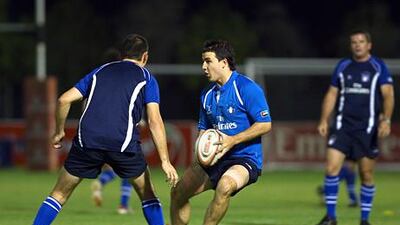The UAE made the worst possible start in their bid to persuade the International Rugby Board they deserve a place at December’s Dubai Rugby Sevens, after they lost both their matches in the pool stage of the Shanghai Sevens Saturday.
The newly formed UAE sevens side have been told they will have to prove they are worthy of playing in the opening tournament of the HSBC World Series in Dubai later this year.
The team was created after the Arabian Gulf was disbanded at the end of last year, but they did not automatically assume the Gulf’s place in their home competition.
Instead, the IRB will monitor how they fare in the HSBC Asian Sevens series, with this weekend’s opening leg in Shanghai to be followed by tournaments in Borneo and Thailand.
If the game’s ruling body decide the team from the Emirates are not competitive enough, the Dubai Sevens will be the only leg on the nine-tournament World Series not to have a home representative.
Against that backdrop, defeats against the Philippines and Korea Saturday, each of whom are below the UAE - who are officially the third-best side in Asia in the 15-man game - were especially disappointing.
The best the UAE can hope to finish in China, dependant on them winning both of their Bowl matches Sunday, is ninth.
“We have put in structures and tried to play the basics of sevens rugby but it takes time to learn and today was one of those days,” Tim Fletcher, the UAE captain, said.
The UAE could point to mitigating factors for their poor return, such as the dramatic turnover in players since the Gulf side was dissolved, a general lack of experience in the format, or even the poor weather conditions.
Arguably the most significant inhibiting issue, however, could be the ongoing confusion over the coaching position. The UAE Rugby Association said at the start of the summer they would welcome applications for a new sevens coach.
However, Shane Thornton, the Gulf sevens coach until last year, is still in charge of the side in China and is contracted until December, while the UAE RA have since indicated that a new man to oversee all rugby here, rather than sevens in specific, is the priority.
Thornton, a short-form specialist who still plays on the wing for Dubai Dragons and, intriguingly, will be available for selection for the UAE himself later this year, refused to suggest the confusion over his position had any effect on his side.
Instead he pointed to the rawness of his squad as a reason for the opening day defeats.
“We have a whole new side from last year, so it is a rebuilding job again,” the New Zealander said.
“It is typical of Dubai rugby, with people coming and going all the time and you never get a consistent side all the way through, but we are just trying to get players into the game.”
Several Gulf players are now ineligible for the UAE national team, such as the outstanding Abu Dhabi-born playmaker, Jonny Macdonald, who has since been picked by Scotland.
“There are no excuses, but sevens is a game you need to play and play and play,” Sean Hurley, the UAE’s tour manager, whose expertise as a player were sorely missed due to injury today, said.
“Guys are starting to learn what they need to do and how they need to play, so this weekend has become a learning experience now.”


